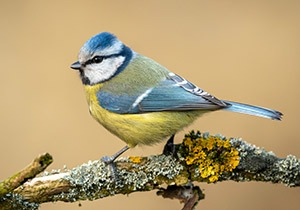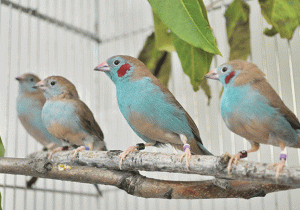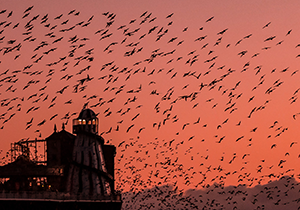Birds Bounce Back in the Amazing Azores!
NG KiDS heads to the Azores to meet a unique winged wonder….
Rising up from the Atlantic Ocean are a group of nine incredible volcanic islands, called the Azores. The seas surrounding these rugged isles are home to amazing marine life, such as dolphins, whales and turtles, while flocks of seabirds swoop around the craggy coastline. But there’s also a very rare and special creature that NG Kids travelled to the Azores to see… the Azores Bullfinch, or priolo, which only lives on the island of São Miguel!
Prehistoric Forest!
The priolo bird lives in what is known as Laurel Forest. Found in mild and humid areas, this special kind of forest has existed for millions of years – since dinosaurs roamed the planet! The beautiful islands were once covered in Laurel Forest but, sadly, since humans arrived in the Azores, much has been chopped down to make way for houses, farms and roads. Today, it can only be found on a few of the islands. Settlers have also introduced exotic plants and trees from other countries which have, overtime, outcompeted the islands” native flora.
To the Rescue!
Sadly, losing the Laurel Forest had a devastating impact on the priolo birds, which rely on the flowers and seeds from the trees to survive. The birds, which measure between 15-17cm from tip to tail, were almost extinct when SPEA, the Portuguese Society for the Study of Birds, and the government of the Azores jumped into action! “We launched a programme on the island, which aims to protect the remaining Laurel Forests and the animals that live there, including the priolo,” SPEA”s Joaquim Teodósio told NG Kids. Yay!
Bird Buddies!
Luckily for the priolo, the project seems to be working. “We have volunteers who help us to carefully go through the forest and remove all the plants and trees that shouldn’t really be here in the Azores,” says Azucena de la Cruz Martin from SPEA. “This gives the Laurel Forest a chance to grow, so there is more food for the priolos. Since the project started in 2003, the number of birds has doubled to around 1,000!” Thanks to the work of Joaquim, Azucena and their team, their bird friends now have a bright future!
Fancy inviting beautiful birds to your garden at home? Then check out our Make a Bird Feeder primary resource – a fun activity for at home or in the classroom!
Ben’s Top Tips!
Adventurer and TV presenter, Ben Fogle, is an ambassador for the Azores. Check out his five tips for fun things to do on the islands…
1. “Go island hopping by ferry – each one is incredible in a different way.”
2. “Meet the local marine life on a whale watching or dolphin expedition.”
3. “Have a tasty dinner cooked naturally underground in a volcanic pit – yum!”
4. “Take a dip in the naturally heated hot pools at the ocean’s edge – great fun!”
5. “Climb one of the island’s volcanic peaks for an amazing view.”
Did you know…?
There are nine major islands in the Azores: São Miguel, Santa Maria, São Jorge, Pico, Graciosa, Flores, Corvo, Faial and Terceira.
Words: Lauren Jarvis.
Photos: Priolo birds: Pedro Monteiro
More Like Birds

Get to know garden birds

Puffin facts!

Scientists discover birdie tap dance that’s invisible to the naked eye













LEAVE A COMMENT
THANK YOU
Your comment will be checked and approved shortly.
WELL DONE,
YOUR COMMENT
HAS BEEN ADDED!
COMMENTS
tweet im a bird
Such beauty these birds hold
awsome
i think birds are awsome the birds of prey are cool but the prettier birds are really cool i love them!!!!! #squa!!
awseome!
the amazin amazon! awesome
this really helpful!thanks.
Cool!
epic
COOL!
I love this . Thanks
CUSTOMIZE YOUR AVATAR